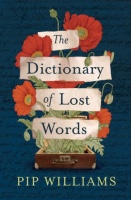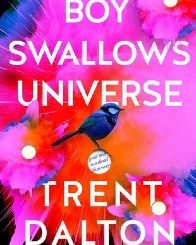The Dictionary of Lost Words by Pip Williams

“In 1901, the word ‘Bondmaid’ was discovered missing from the Oxford English Dictionary. This is the story of the girl who stole it.
Esme is born into a world of words. Motherless and irrepressibly curious, she spends her childhood in the ‘Scriptorium’, a garden shed in Oxford where her father and a team of dedicated lexicographers are collecting words for the very first Oxford English Dictionary. Esme’s place is beneath the sorting table, unseen and unheard. One day a slip of paper containing the word ‘bondmaid’ flutters to the floor. Esme rescues the slip and stashes it in an old wooden case that belongs to her friend, Lizzie, a young servant in the big house. Esme begins to collect other words from the Scriptorium that are misplaced, discarded or have been neglected by the dictionary men. They help her make sense of the world.”
This is our Book Club’s choice for November and it’s bound to make for an interesting discussion. I think that some members will really love this book while others may have reservations.
I am still of two minds, myself, about my opinion of this book. The story of the creation of the dictionary is so interesting. I had never really thought about words in this way; what goes in and what gets left out, and the bias towards neglecting the language of women and the lower classes. It is extensively researched and also touches on subjects of single parenthood, the suffrage movement and World War 1.
I loved the idea of the book and what it promised. I thought that Esme would develop into an interesting character but there I was left a bit disappointed as I felt her character was a bit bland. There’s a mixture of fictional characters with the actual characters who were involved in the creation of the Oxford Dictionary and this, I think, restricted the development of the fictional characters. To me, it felt that she was in the background of the real action perhaps because she was not really there. A bit like the photograph that she takes later in the book. She has to be the photographer, to explain why she is not in the real photo. It felt that the dictionary was the real hero of the story rather than Esme.
The story centres on her actions at certain periods of history but we don’t really get to understand her feelings and why she acts as she does. At times, too, her responses seem more like a modern girl than a girl of her time and the style of the book in some chapters seems to reflect current thinking rather than the early 20th century. There was a lot to cover in this story, and the book is very long, (I was reading on an e-reader so didn’t realise just how long until I finished) so it’s understandable that her latter years are not covered in any detail. But I felt it was a bit unsatisfying for this period of her life to be left out as it could have summarised her life experiences and rounded out her character.
While this review may sound a bit negative and that I disliked the book, it’s certainly not the case. I feel this book has a lot to offer and has some lovely writing at times. Despite the length, I stayed interested and just skipped through the parts that I found a bit tedious.
Would I recommend this book; yes definitely. The concept is fascinating, the writing compelling and there were some thoughtful reflections on language and the meaning of words. It really makes you think about the role and perspective of women in the creation of the dictionary and of other history books as well and also, at the end, makes you think about the neglect of aboriginal languages in our society.






